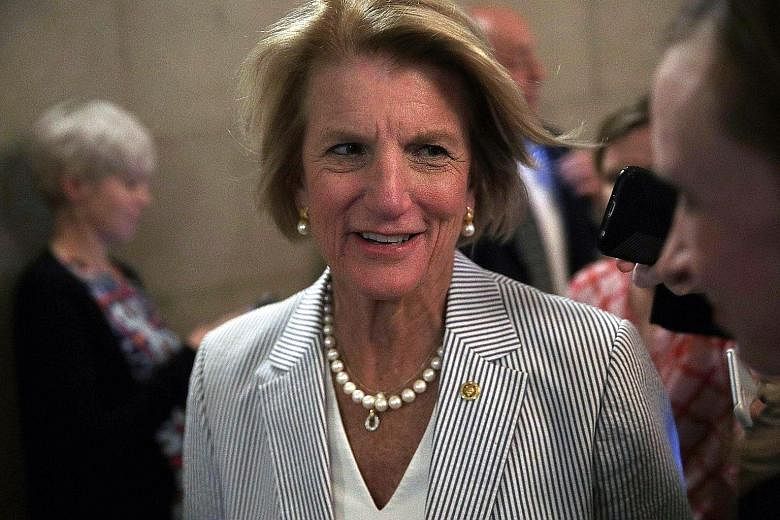WASHINGTON • It was men who started it. It may be women who finished it.
The US Senate effort to repeal the Affordable Care Act, a process that began with 13 Republican men drafting a plan behind closed doors, collapsed on Tuesday, as three Republicans said they would not support an ultimately futile attempt to simply roll back the current healthcare law without a replacement.
Though all three are women, their objections have little to do with their sex and more to do with the legislation's cuts to Medicaid. In a twist, that aligns them with President Donald Trump's campaign promise not to touch Medicaid, which helps low-income people, pregnant women and people with disabilities, among others, as well as those eligible under the Affordable Care Act's expansion of the programme in 31 states and the District of Columbia. Who are these senators, and why did they break with their party's leaders?
SENATOR SHELLEY MOORE CAPITO OF WEST VIRGINIA
She became the first woman elected to the Senate in her state's history in 2014. Since then, she has proved open to working with Democrats, particularly in addressing the acute opioid problem in West Virginia.
The state expanded Medicaid under president Barack Obama's healthcare law, a decision that increased the number of her constituents with health insurance.
Ms Capito expressed reservations about Republican proposals, calling for a plan that would at least draw out the rollback of federal payments made to states under the healthcare law over several years. But on Tuesday, she said every Senate proposal had failed to address her concerns.
SENATOR LISA MURKOWSKI OF ALASKA
Ms Murkowski has been a more centrist voice among Republicans during her more than 14 years in the Senate, demonstrating a similar willingness to defy her party for the sake of her state.
Though she pointed to skyrocketing premiums and dwindling options, Ms Murkowski was unconvinced that Alaska's problems - particularly its high healthcare costs - would have been helped by the original Republican plan to repeal and replace the law. The state expanded Medicaid, which covers about a quarter of its residents, and earlier this year Ms Murkowski said that as long as the Alaska Legislature wanted to keep that expansion, she would not vote to repeal it.
SENATOR SUSAN COLLINS OF MAINE
The most moderate Republican in the Senate, Ms Collins has proved to be one of her party's sturdiest obstacles to repealing the Affordable Care Act. As was the case for Ms Capito and Ms Murkowski, Ms Collins opposed her party's proposals to make deep cuts to Medicaid, criticising the effects on the "most vulnerable." While Maine did not expand Medicaid, the healthcare law's subsidies increased the number of individual policy holders in the state to 80,000 from 30,000. And the proposals were projected to increase rates in particular for older Americans, a particular problem for Maine, where the median age of 43 is the oldest in the country.
NYTIMES



